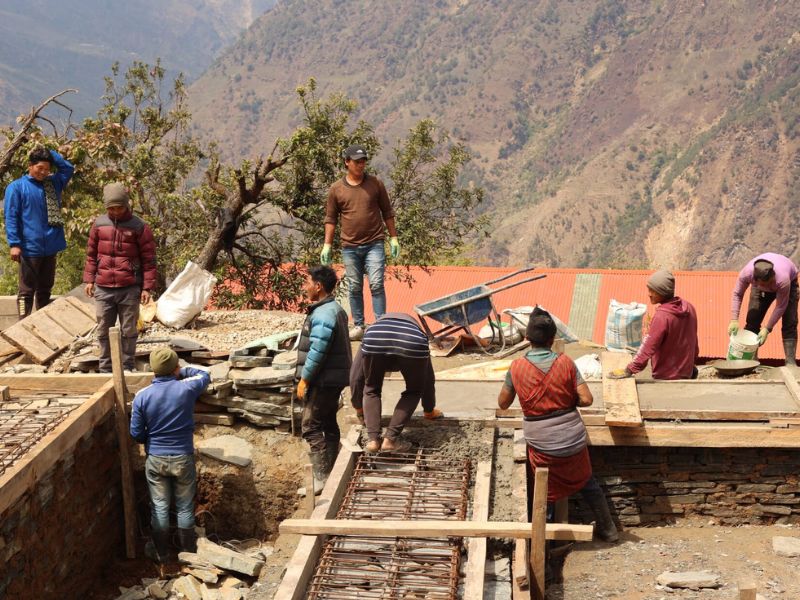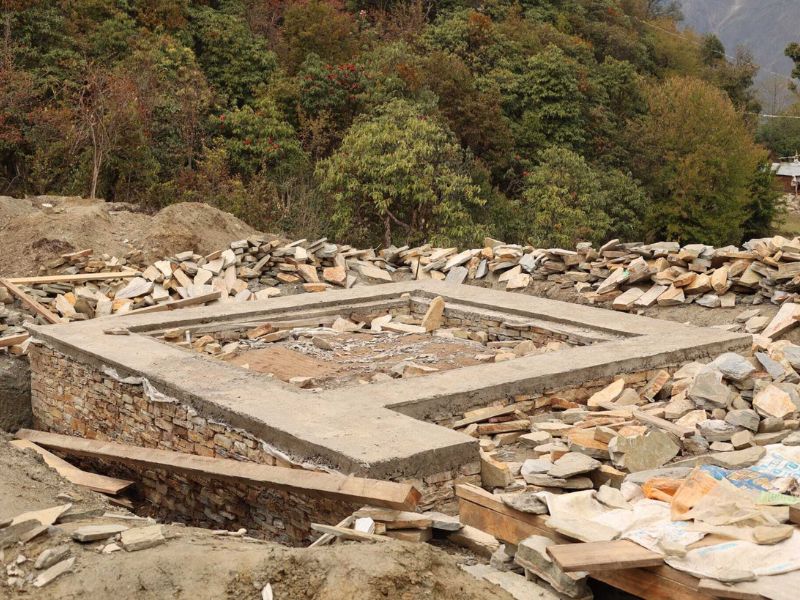
Our goal is to create an optimal teaching and learning environment for children, with specialized early childhood development teachers, sanitation facilities, appropriate seating arrangements and a ready supply of clean water.
Rahul Shrestha, Program Manager – Education and Environment, Nepal
Access to quality education for every citizen is a fundamental right in Nepal. However many rural areas in the Himalayas, are still marginalized. In Ruby Valley, Kharsa village is one example.
In Kharsa Karuna-Shechen collaborated with the local communities to build a school. With the help of four french architects the construction project for Kharsa School was started in 2021 and completed in 2024. The first students are already attending.
Addressing Local Needs
Kharsa, located at an altitude of 2,000 meters, has 100 households engaged in agriculture and livestock. We found that educational opportunities were limited, and the existing school in the village was not adequately equipped to meet the needs of the children or the staff.
It was also vulnerable to climatic conditions such as earthquakes and heavy rains during the monsoon season. To improve these conditions, we began the construction of the new school in December 2022. This project has expanded and renovated the existing building to create a new, modernized facility.
Discover the Beginnings of the Kharsa School Renovation Project
Prior to this project, our school faced numerous challenges, with first grade and kindergarten students cramped together in a single classroom, lacking essential amenities like separate kitchens and having no dedicated ECD spaces. However, the completion of the new building has ushered in a remarkable transformation.
Ashmita Tamang, Principal and ECD Teacher at Kharsa Primary School

Enhanced Infrastructure

- Additional Classrooms: To eliminate multi-grade classes, four new classrooms were added to the new building.
- Functional Facilities: It was essential to increase safety, general well-being, and improve working conditions. An indoor playroom, restrooms, a kitchen, and a staff room are part of the new school
- Resilient Building: One of the main goals was to create a building that could meet the challenges of the geography and the climate. Thus, construction techniques combining local artisans’ materials with the architects’ expertise resulted in a more resilient school, adapted to regional challenges and cultural context. New features include retaining walls and staircases.
The project’s success was underpinned by strong partnerships and collaborations. A team of French architects designed the project, spending time in Kharsa village to study local design, construction techniques, and cultural aspects. During the construction phase, we partnered with the local rural municipality and formed a construction committee, which played a crucial role in managing local labor and materials. This collaborative effort ensured the project met its objectives while respecting local traditions and requirements.
Rahul Shrestha
The construction, completed in February 2024, has achieved significant milestones. We now have six classrooms. Additional furniture and play-based learning equipment will soon be provided to fully meet the goals of the Early Childhood Development program.
Collaboration as a Cornerstone
Throughout the development of this project, we encountered challenges: working with local materials, transportation difficulties to the Ruby Valley, and the monsoon season… All these factors complicated the smooth execution of the project. Nevertheless, the determination of the communities, the Karuna teams, and the architects involved made it possible for Kharsa School to come to life.
The final steps will take place between October 2024 and February 2025. These include insulating the classrooms, improving rainwater drainage, and installing a boundary wall to protect the building from flooding.
This initiative is nearing completion, with 35 children and 3 staff members already enjoying the new facility.

This new infrastructure will not only enhance the educational experience for current students, but also support future generations. With improved facilities and a more robust organizational structure, the school will serve as a cornerstone for community development, fostering a brighter future for everyone in the area.
Milan Tamang, Chairperson of the Kharsa School Management Committee
Support the Children of Ruby Valley









